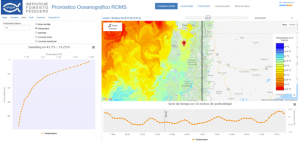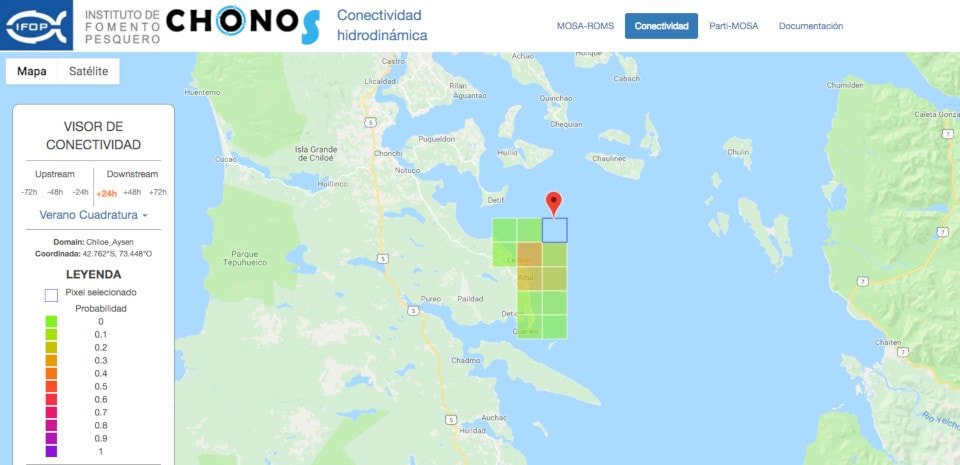IFOP’s Oceanographic studies and numerical tools for coastal management workshop.
September 4th, 2018 During the activity, Chilean southern zone oceanographic and atmospheric forecasting models development system will be addressed, which allows us to know, with an horizon of 3 days, will grant the opportunity to know what are currents oceanographic conditions, temperature or salinity that will predominate in the zone, as well as atmospheric conditions related to wind, air temperature, precipitation, and radiation among others.
During the activity, Chilean southern zone oceanographic and atmospheric forecasting models development system will be addressed, which allows us to know, with an horizon of 3 days, will grant the opportunity to know what are currents oceanographic conditions, temperature or salinity that will predominate in the zone, as well as atmospheric conditions related to wind, air temperature, precipitation, and radiation among others.
On September 6th , “Oceanography and numerical tools for coastal management” workshop will be held in Castro, conducted by IFOP Environment Aquaculture Research Division Department, within Performance Agreement between Undersecretariat of Economy and Fisheries Development Institute.
This workshop aim is bringing the community closer to the studies carried out in the inland sea of Chiloé by Fisheries Development Institute Putemún center scientists team. The execution of these studies has allowed an oceanographic information system development, which combines both observations and numerical models to generate environmental information for decision making. This system is called CHONOS, it is available publicly in https://www.ifop.cl/chonos/.
During the workshop oceanographic and atmospheric forecasting models system development for Chile’s southern zone will be addressed, this system allows to know with a horizon of 3 days, which are the oceanographic conditions of currents, temperature or salinity that will predominate in the zone, as well as atmospheric conditions related to wind, air temperature, precipitation, and radiation among others. These models allow the coupling of different extra modules, highlighting the PartiMOSA tool, which is an interactive movement of particles in water visualizer subject to the effect of currents. This powerful forecasting system has been developed with Geophysics of the Universidad de Concepción Department collaboration .
In IFOP researcher Osvaldo Artal words, “This unprecedented operational forecasting system, in Chile, allows to deliver environmental information in an expeditious manner and with free access for decision making by the authorities or can even be used in schools to teach to young people about fresh and salt water interaction in inland sea of Chiloé “. On the other hand, “a high resolution atmospheric forecast will allow us to resolve local patterns that manifest in the complex topographic system of this area and that connects with online weather stations network currently implementated by IFOP in Los Lagos and Aysén region , IFOP researcher ” Oliver Venegas, says.
“As part of these projects execution, extensive oceanographic campaigns were carried out in inland sea of Chiloé, which allowed us to continuously observe currents variations, temperature, salinity, dissolved oxygen and nutrient in different points of inland sea of Chiloé. This information allowed to establish water masses spatial and temporal variations and physical processes identification that interact with biogeochemistry, “says IFOP researcher Gabriel Soto.
Valentina Besoaín, also a researcher at IFOP, adds “All this information contributes to a better understanding of coupling of physical, chemical and biological processes that are essential for biogeochemical models implementation, the great challenge we have today. It should be noted that these oceanographic campaigns led by Fisheries Development Institute, had the collaboration of different scientific groups belonging to Universidad de los Lagos, DGEO and Copas Sur Austral from Universidad de Concepción, Costa-R from Universidad de Valparaíso “.
Finally, using high resolution hydrodynamic models it was possible to estimate important inland sea of Chiloé marine system characteristics, such as connectivity and water exchange. The first seeks to relate the impact of spatial distribution of salmon farming centers around pathogens spread in the industry, while the second seeks to establish those areas of low ventilation that can induce a decrease in dissolved oxygen and nutrient accumulation. .
For those interested in attending the workshop, you can contact Elias Pinilla at elias.pinilla@ifop.cl.
